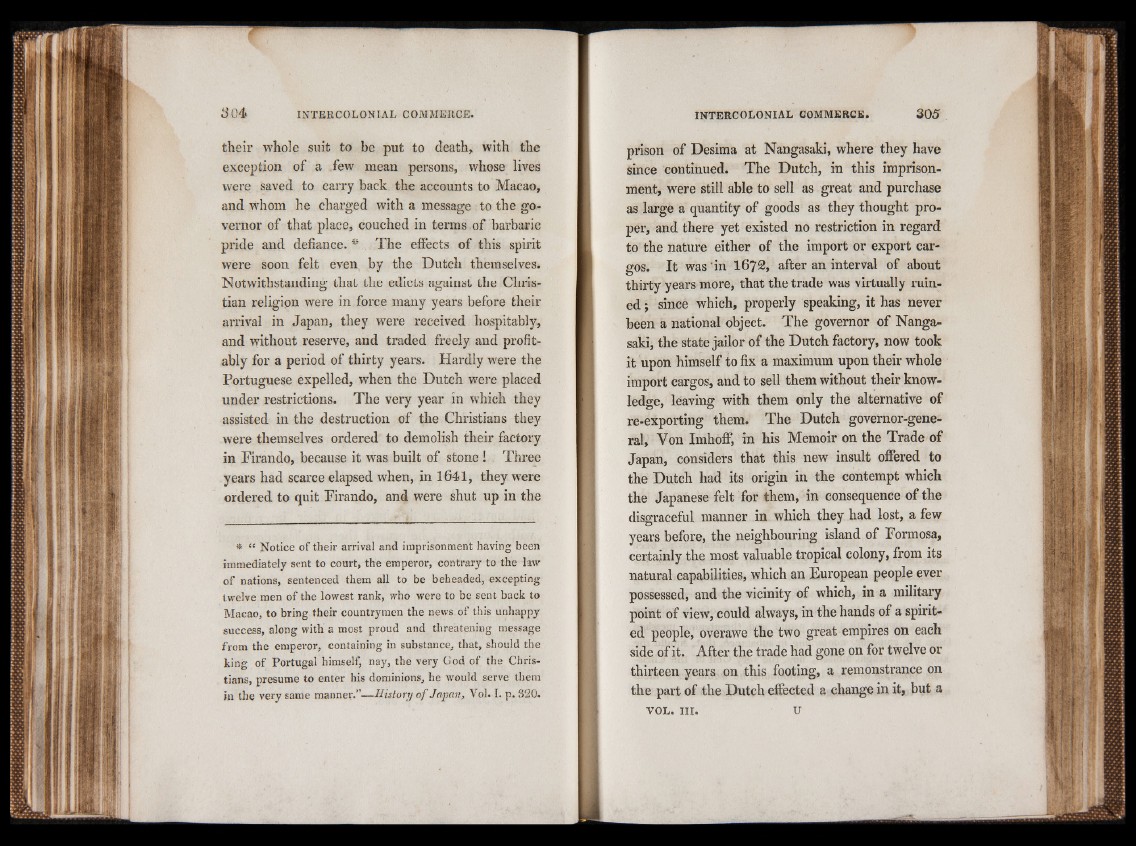
their whole suit to be put to death, with the
exception of a few mean persons, whose lives
were saved to earry back the accounts to Macao,
and whom he charged with a message to the governor
of that place, couched in terms of barbaric
pride and defiance. * The effects of this spirit
were soon felt even by the Dutch themselves.
Notwithstanding that the edicts against the Christian
religion were in force many years before their
arrival in Japan, they were received hospitably,
and without reserve, and traded freely and profitably
for a period of thirty years. Hardly were the
Portuguese expelled, when the Dutch were placed
under restrictions. The very year in which they
assisted in the destruction of the Christians they
were themselves ordered to demolish their factory
in Firando, because it was built of stone ! Three
years had scarce elapsed when, in 1641, they were
ordered to quit Firando, and were shut up in the
* “ Notice of their arrival and imprisonment having been
immediately sent to court, the emperor, contrary to the law
of nations, sentenced them all to be beheaded, excepting
twelve men of the lowest rank, who were to be sent back to
Macao, to bring their countrymen the news of this unhappy
success, along with a most proud and threatening message
from the emperor, containing in substance, that, should the
king of Portugal himself, nay, the very God of the Christians,
presume to enter his dominions, he would serve them
in the very same manner.”—History of Japan, Vol. I. p. 320.
prison of Desima at Nangasaki, where they have
since continued. The Dutch, in this imprisonment,
were still able to sell as great and purchase
as large a quantity of goods as they thought proper,
and there yet existed no restriction in regard
to the nature either of the import or export cargos.
It was 'in 1672, after an interval of about
thirty years more, that the trade was virtually ruined
; since which, properly speaking, it has never
been a national object. The governor of Nangasaki,
the state jailor of the Dutch factory, now took
it upon himself to fix a maximum upon their whole
import cargos, and to sell them without their knowledge,
leaving with them only the alternative of
re-exporting them. The Dutch governor-general,
Yon Imhoff, in his Memoir on the Trade of
Japan, considers that this new insult offered to
the Dutch had its origin in the contempt which
the Japanese felt for them, in consequence of the
disgraceful manner in which they had lost, a few
years before, the neighbouring island of Formosa,
certainly the most valuable tropical colony, from its
natural capabilities, which an European people ever
possessed, and the vicinity of which, in a military
point of view, could always, in the hands of a spirited
people, overawe the two great empires on each
side of it. After the trade had gone on for twelve or
thirteen years on this footing, a remonstrance on
the part of the Dutch effected a change in it, but a
v o l . i n . u